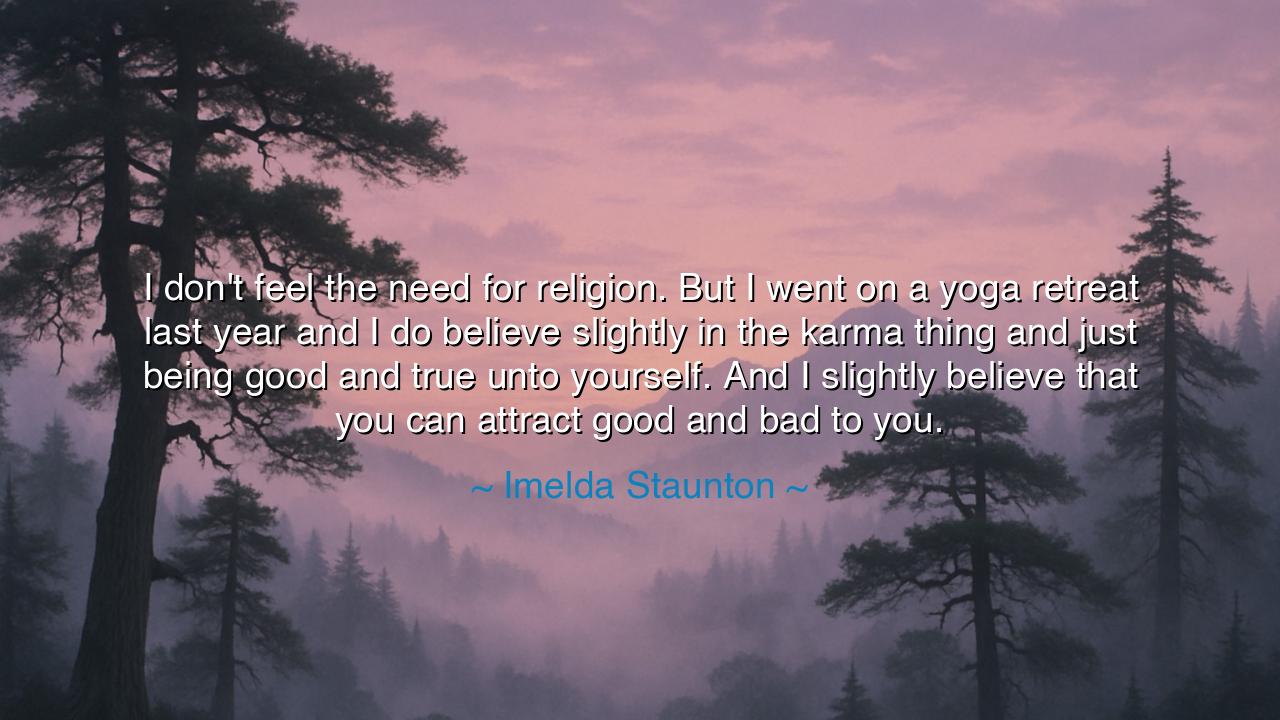
I don't feel the need for religion. But I went on a yoga retreat
I don't feel the need for religion. But I went on a yoga retreat last year and I do believe slightly in the karma thing and just being good and true unto yourself. And I slightly believe that you can attract good and bad to you.






Hear now, O seekers of wisdom, the words of Imelda Staunton, who speaks with the gentle reflection of one who has walked her own path of self-discovery: "I don't feel the need for religion. But I went on a yoga retreat last year and I do believe slightly in the karma thing and just being good and true unto yourself. And I slightly believe that you can attract good and bad to you." These words are a meditation on the modern soul’s search for meaning, beyond the confines of traditional religion, and the belief in universal laws that govern the forces of good and evil in the world. Imelda speaks not from the confines of a doctrine but from a place of deep personal experience, embracing what resonates with her inner truth.
In ancient times, karma was a concept understood by many, especially those who followed the teachings of the Buddha and the Hindu sages. The law of karma suggests that the actions of a person, whether good or bad, return to them in kind, shaping their destiny. This was not just a moral teaching but a way of understanding the interconnectedness of all things, where every action ripples outward into the vast sea of existence. The ancient texts spoke of karma as a cosmic law, one that transcended religions and connected all of humanity in the web of cause and effect. The Buddha, in particular, taught that our actions in this life shape the experiences of our next, emphasizing that we are responsible for our own fate and the energies we put into the world.
The concept of karma and the connection to one’s actions is echoed in the story of the ancient Greeks, particularly in the myth of Oedipus, whose fate was determined by the choices he made, despite the efforts of gods and prophets to warn him. Oedipus, through his own ignorance and pride, brought about his tragic downfall, revealing that the forces of fate were not some external power, but the result of his own actions. In this, we see a precursor to the understanding of karma: that our decisions, the good and the bad, shape our destiny and influence the world around us. This ancient wisdom reminds us that we are not mere victims of circumstance, but active participants in the unfolding of our lives.
Imelda’s reflection on karma, the belief that we can attract good and bad through our own actions and intentions, draws us into the understanding that we, as humans, are both creators and responders to the energies we send out into the world. Consider the great leaders and figures who have lived in accordance with their values—Mahatma Gandhi is a perfect example. His life of nonviolence, truth, and selfless service shaped not only his own destiny but also the course of a nation. Gandhi’s commitment to good attracted the support of millions, and his efforts to promote justice and compassion reverberated throughout the world. His life teaches us that when we act in alignment with our highest principles, we attract not only good into our own lives but also bring about change in the world.
At the same time, we must recognize that the reverse is also true—when we act out of selfishness, anger, or dishonesty, we invite into our lives the negative forces of discontent and suffering. The ancient Stoics, particularly Marcus Aurelius, spoke of the importance of maintaining an inner virtue and peace despite the challenges that might arise. To be true to oneself, to act with integrity and wisdom, was, for them, the path to not only personal peace but to a life of meaning and virtue. This Stoic approach aligns with Imelda’s idea of being true unto yourself, for it is only when we live authentically and in harmony with universal principles that we can attract the good that the world has to offer.
Thus, the lesson is clear: karma is not merely a mystical law but a deep, universal truth that binds our actions, our intentions, and our lives together. We are not passive beings drifting along the currents of fate; we are active participants in the creation of our own destinies. To live a life of integrity, to be true to oneself, is to engage in the world with intentionality, recognizing that every thought, word, and deed sends forth an energy that shapes not only our future but the future of those around us.
So, O seekers, take these teachings into your own life. Understand that you are the architect of your own fate, and that every action you take sends ripples through the world. Choose to act with kindness, integrity, and wisdom, knowing that you are not only shaping your own destiny but the destiny of the world around you. Attract the good by embodying goodness, and recognize that when you live authentically, the universe will respond in kind. In this, you will find not only peace but the joy of a life well-lived, aligned with the deepest truths of existence.






AAdministratorAdministrator
Welcome, honored guests. Please leave a comment, we will respond soon